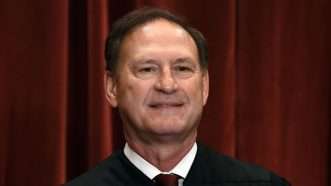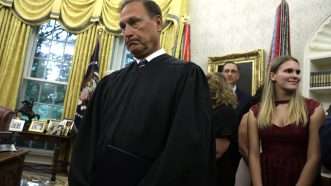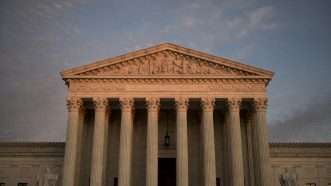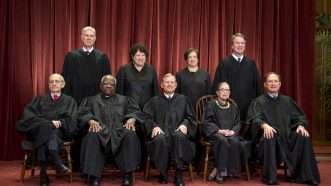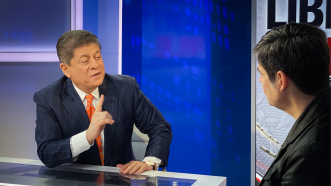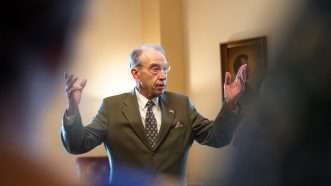Constitution
Uber's Lawsuit Against California's Anti-Freelancer Law Is Missing a Key Constitutional Element
It's crucial to get the constitutional text and history straight.
Lawson on Conservatives versus Constitutionalists
Is the Rule of Law a Law of Rules or a Law of Law? Some conservatives seem to prefer the former. Should they?
Rudy Giuliani Wants the Supreme Court To Nullify Trump's 'Unconstitutional' Impeachment
The legal basis for such a ruling is hard to find.
No War With Iran, House Tells Trump. Next Up: Finally Forbidding Military Force in Iraq?
Plus: Tarriffs are killing U.S. wine, Vermont bill would ban cell phones for kids, and more...
Sarah Sanders 'Can't Think of Anything Dumber Than Allowing Congress To Take Over Our Foreign Policy'
The former press secretary thinks abiding by the Constitution would be the worst thing for America right now.
Justice Department Tells States the Equal Rights Amendment Is Dead
Plus: Rand Paul says White House's war-powers arguments are "absurd," the Cato Institute wants Congress to investigate the FBI, and more...
California Law Unconstitutionally Discriminates Against Certain Workers, Argue Uber and Postmates
Gig workers and companies are suing over a California law, AB 5, that criminalizes their continued employment.
Now That It's Toothless, Obamacare's Individual Mandate Is Unconstitutional
The shifting understanding of the requirement to buy health insurance elevates form above substance.
Impeachment Overshadows Obamacare Ruling
Plus: States sue to stop Equal Rights Amendment, French sex workers take prostitution laws to E.U. court of human rights, and more...
Elizabeth Warren Wants To Tax Lobbying
Her lobbying tax proposal is pseudo-policy, a veneer of wonky seriousness over dubious populist dogma.
It's Bill of Rights Day. Do Americans Still Care?
The greatest threat to protections for our freedom may be people's fear that people who disagree with them are exercising their rights.
"High Crimes and Misdemeanors" as an Inkblot
No constitutional provision should be ignored just because it may be difficult to discern
California Court of Appeal decides Vaquero, an interesting private-delegation case
Banzai! Can surface rights owners control the rights of those who own the mineral rights underneath? In this case, yes.
Alito Faults Supreme Court for Refusing to Hear 'Disfavored Speech' Case
“If the Court is serious about protecting freedom of expression, we should grant review.”
New York City, Which Defended Its Onerous Gun Transport Restrictions As Necessary for Public Safety, Concedes They Weren't
Several justices seem skeptical of the claim that revising the rules after SCOTUS agreed to consider a challenge to them made the case moot.
Gun Control Returns to the Supreme Court
The justices will hear oral arguments today in a major Second Amendment case.
Oregon Cops Are No Longer Allowed To Routinely Turn Traffic Stops Into Criminal Investigations
The Oregon Supreme Court says police may not grill drivers or ask to search their cars without reasonable suspicion of criminal activity.
Kavanaugh Joins Gorsuch in Fight To Revive Nondelegation Doctrine
An important development in the legal wrangling over the separation of powers.
Judge Napolitano: Enough Evidence 'To Justify About Three or Four Articles of Impeachment'
“The evidence of his impeachable behavior at this point, in my view, is overwhelming," says the Fox News analyst.
"I Don't Think We've Had Any [Constitutional] Crises in My Lifetime": Judge Douglas H. Ginsburg
The legendary jurist and champion of "originalism" who withdrew his name from Supreme Court consideration weighs in on Donald Trump's impeachment, Brett Kavanaugh, Neil Gorsuch, and his upcoming PBS series on the Constitution.
Puppies and Kittens Trump the Constitution
The new federal ban on animal cruelty converts the Commerce Clause into a general police power.
Is the "Faithless Elector" Coming to the Supreme Court?
A recently-filed cert petition gives the Court a good opportunity to rule on the constitutional role of presidential electors
What Is a 'Well Regulated Militia,' Anyway?
The Founders liked militias, but they also liked an armed citizenry. To them, the two ideas were inseparable.
Congress Tortures the Constitution To Obtain Permission for a Federal Animal Cruelty Law
Where does Congress get the authority to redundantly criminalize abuse of mammals, birds, amphibians, and reptiles?
Will Joe Biden Challenge Elizabeth Warren's Constitution-Shredding Proposals?
Unfortunately, rather than challenging Warren on the constitutionality of her plans, Biden is imitating them, at least when it comes to the assault on the First Amendment.
SCOTUS Debates Whether the Right to Trial by Jury Should Mean the Same Thing in State and Federal Court
Understanding what’s at stake in Ramos v. Louisiana.
Trump's Tantrum Over Impeachment Just Got Official
Plus: FBI rebuked by FISA court, how Harris could come back, and more…
My New "Atlantic" Article Making the Case for Abolishing Constitutional Double Standards in Immigration Law
The article explains why we should do away with legal doctrines that largely exempt immigration restrictions from constitutional constraints that apply to virtually every other exercise of government power.
7 Cases Everyone Should Know from the Roberts Court
Heller, Citizens United, Stevens, McDonald, Snyder, Brown, and NFIB
8 More Cases Everyone Should Know from the Rehnquist Court
Gratz, Grutter, Lawrence, McConnell, Raich, Kelo, McCreary County, and Van Orden
7 More Cases Everyone Should Know from the Rehnquist Court
Lopez, Seminole Tribe, Romer, Virginia, City of Boerne, Printz, Morrison
8 Cases Everyone Should Know from the Rehnquist Court
Dole, Morrison, Johnson, Smith, New York, R.A.V., Casey, Church of the Lukumi
Can a Federal Judge Sentence You for a Crime Your Jury Says You Didn't Commit? The Answer May Terrify You
Congress takes up the issue of "acquitted conduct."
7 Cases Everyone Should Know from the Burger Court
Roe, Frontiero, Buckley, Craig, Bakke, Penn Central, and Cleburne
11 Cases Everyone Should Know from the Warren Court
Brown, Bolling, Lee Optical, Cooper, Sherbert, Sullivan, Heart of Atlanta, McClung, Griswold, Loving, and O'Brien
Three Cases Everyone Should Know from the Stone and Vinson Courts
Wickard, Korematsu, and Youngstown
A License for Outrageous Police Conduct
Qualified immunity protects cops from liability for actions that would land ordinary people in jail.
8 Cases Everyone Should Know from the Hughes Court
O'Gorman, Stromberg., Nebbia, Schechter Poultry, West Coast Hotel, Jones & Laughlin Steel, Carolene Products, Darby
11 Cases Everyone Should Know from the White and Taft Courts
Buchanan, Hammer, Schenck, Debs, Abrams, Penn. Coal, Adkins, Meyer, Pierce, Gitlow, and Buck
10 Cases Everyone Should Know from the Waite and Fuller Courts
Cruikshank, Strauder, Civil Rights Cases, Yick Wo, Hans, E.C. Knight, Plessy, Champion, Lochner, and Muller
Don't Destroy the Constitution To Fight Drag Queen Reading Hour
Putting up with some drag-queen storytelling seems like a small price to pay to live in a relatively free society.
8 Cases Everyone Should Know from the Taney and Chase Courts
Prigg, Dred Scott, Merryman, Dewitt, Hepburn, Knox, Slaughter-House, and Bradwell
5 Cases Everyone Should Know from the Jay and Marshall Courts
Chisholm, Marbury, McCulloch, Gibbons, and Barron
Introducing ConLaw.us
An Interactive Web Site To Explore the 100 Supreme Court Cases Everyone Should Know
An Introduction to Constitutional Law: 100 Supreme Court Cases Everyone Should Know
This book and video series teaches the narrative of constitutional law as it has developed over the past two centuries.











